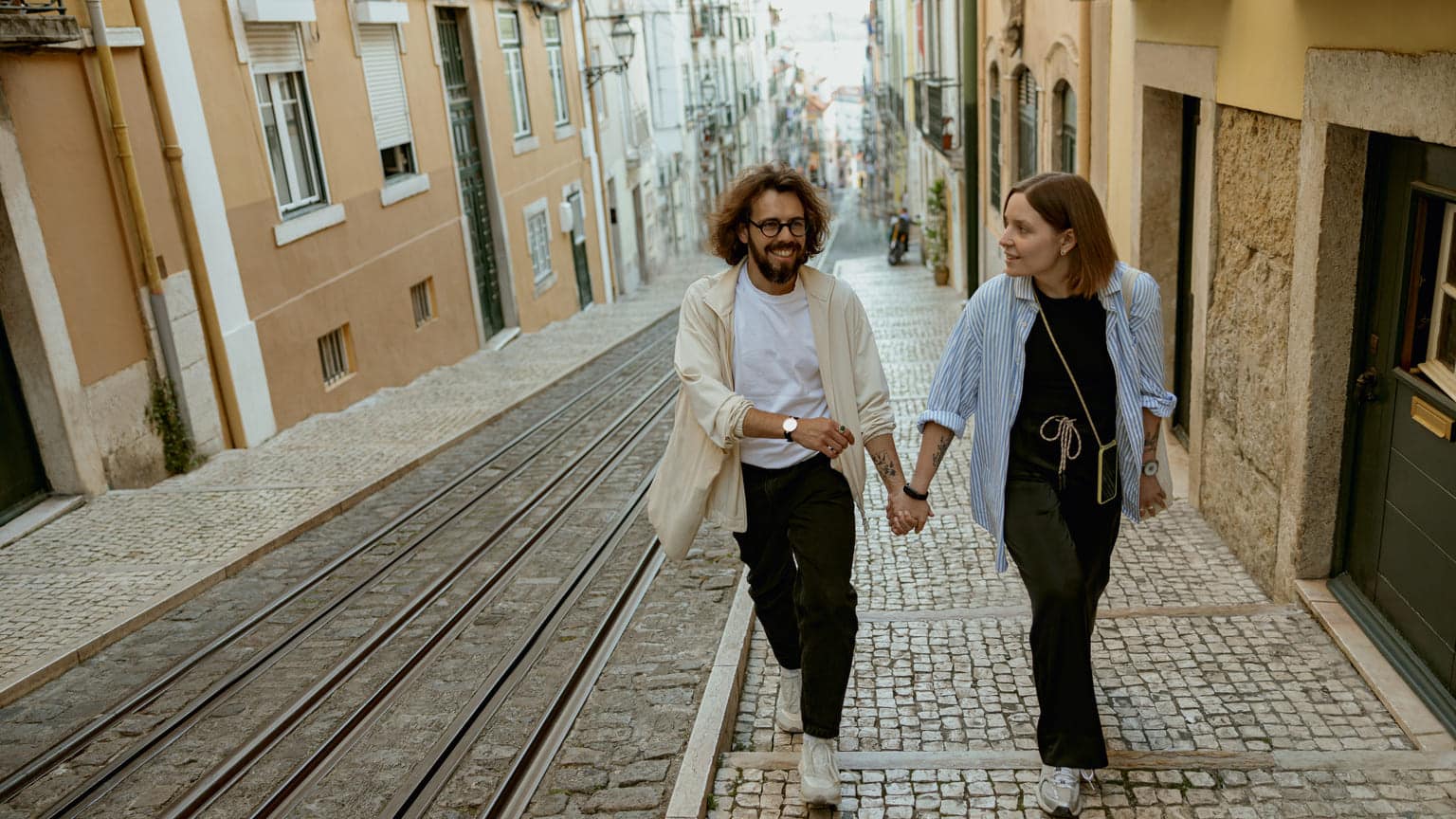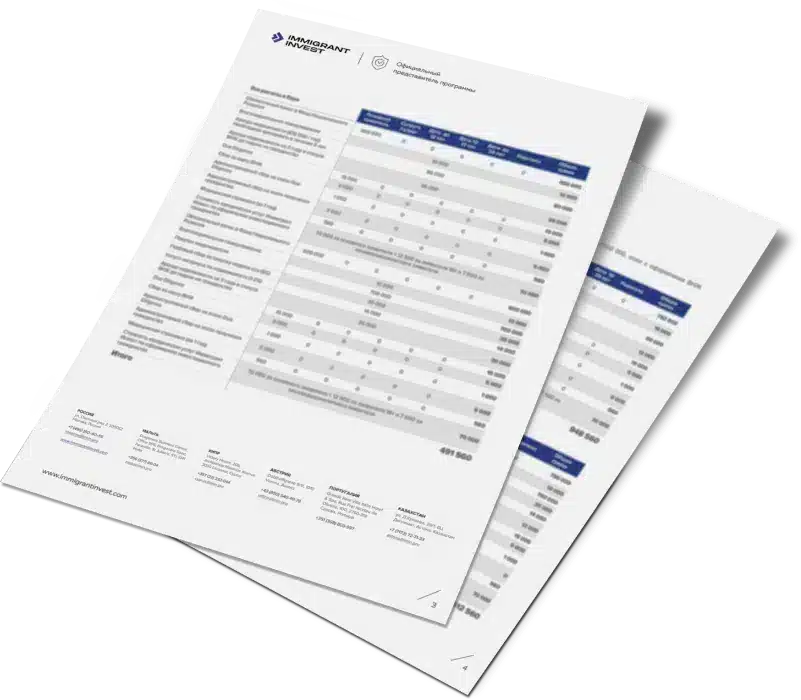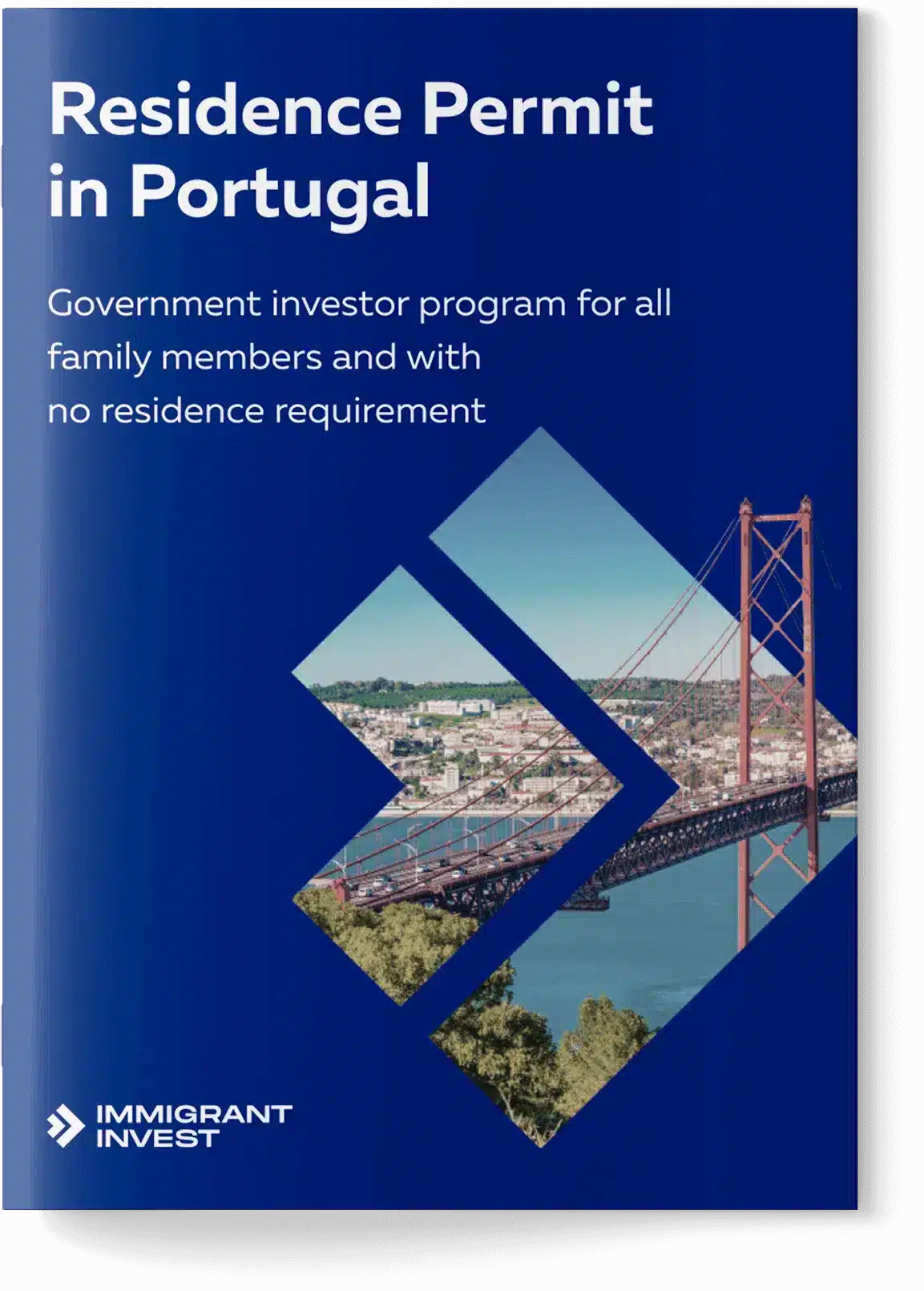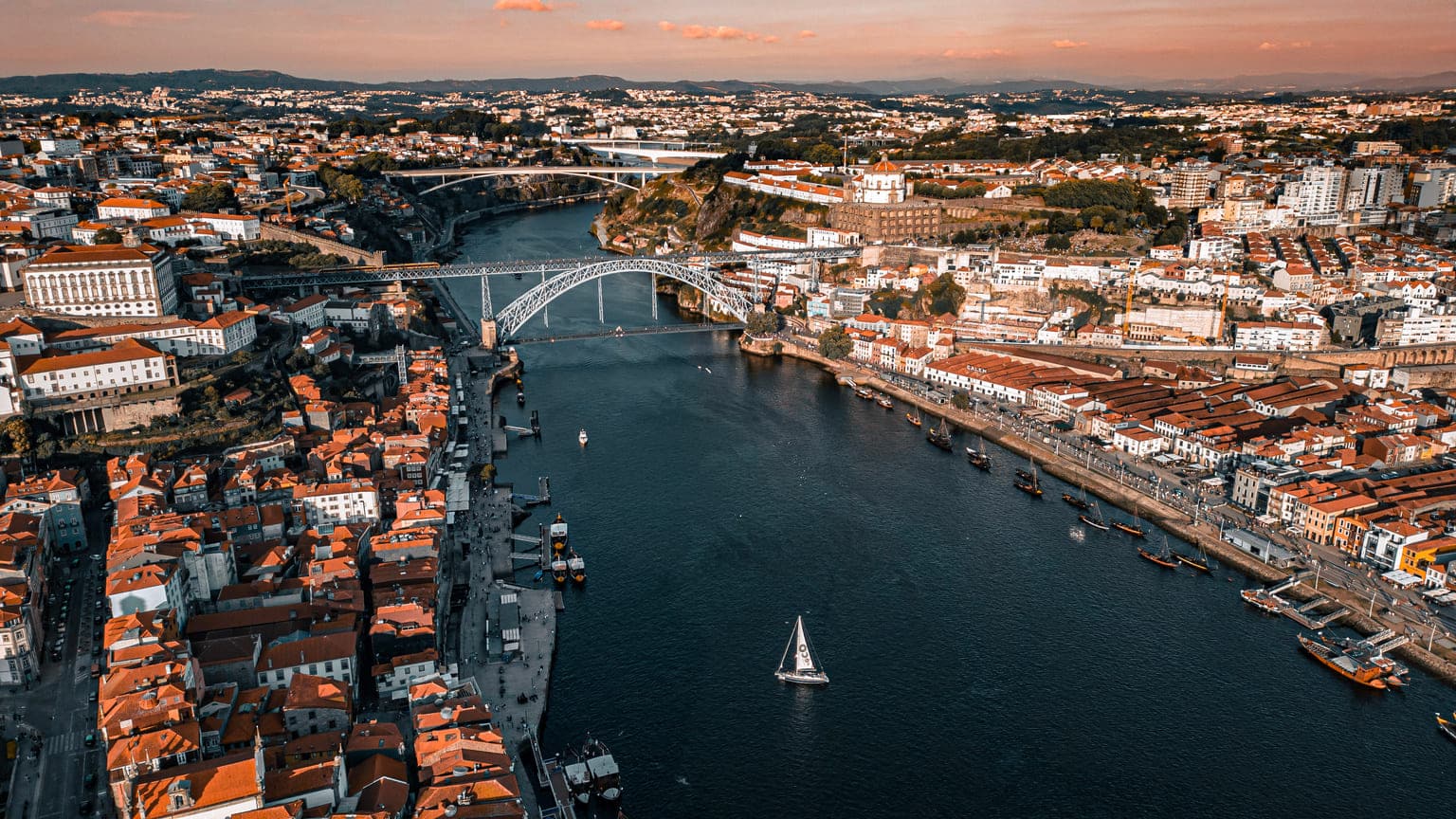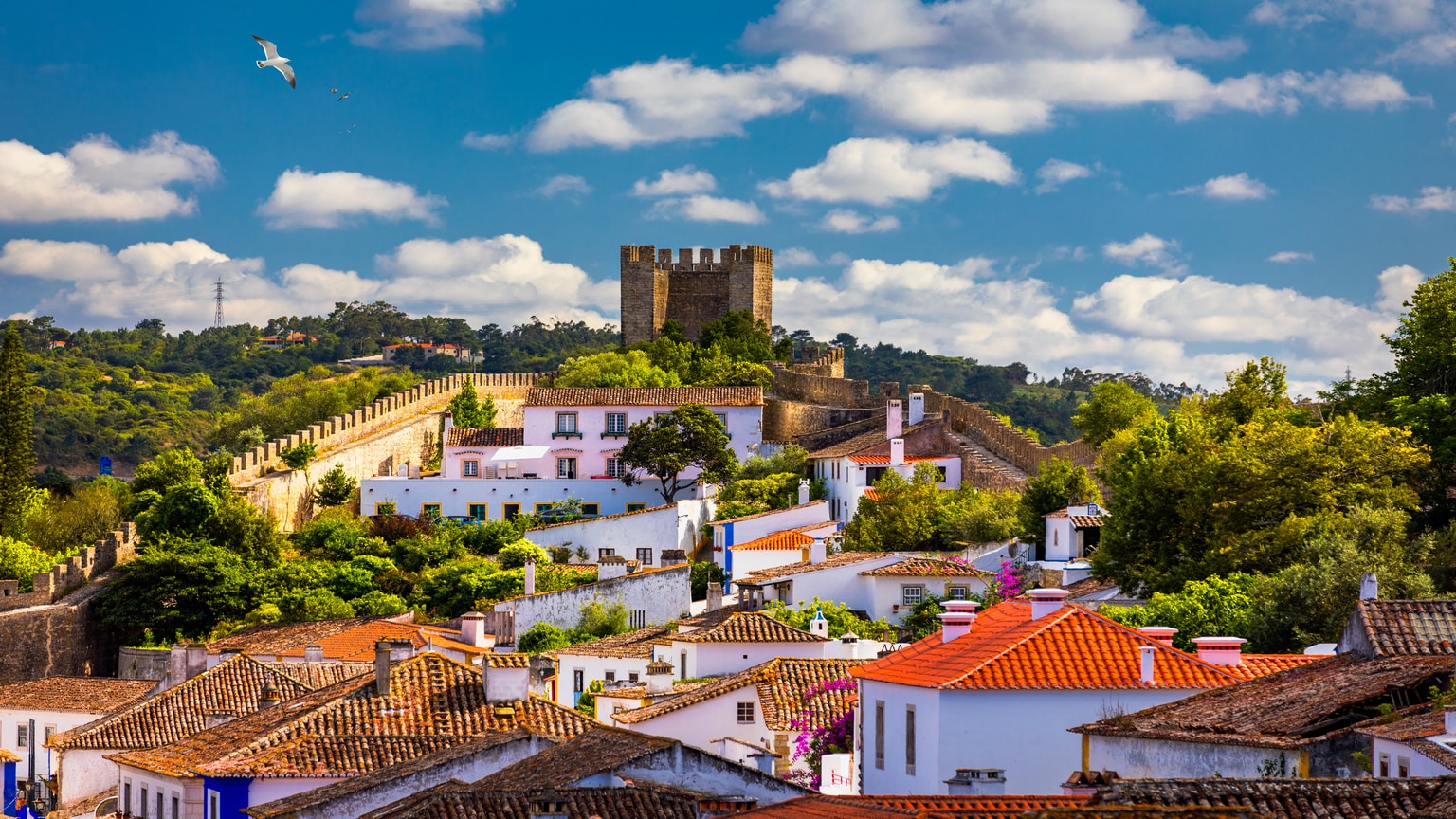Accommodation prices and daily expenses in Portugal
This is what prices look like at the beginning of 2024. The inflation rate in Portugal is expected to be 3.2%, which means all prices in the country will go up by approximately 3—4% by the end of the year.
Renting prices. On average, a one-bedroom apartment in Portugal in the city centre costs approximately €930 per month, while a three-bedroom apartment costs around €1,675. The rent outside the centre is cheaper, at €711 and €1,192 for an apartment with one and three bedrooms, respectively.
Property prices. The cost of an apartment depends on the city and neighbourhood. On average, it is €3,171 per square metre in the city centre and €2,041 outside. For example, a 3-bedroom apartment of 85 m² in downtown will cost approximately €270,000, while in uptown — €173,500.
Utility costs. The monthly cost of basic utilities that include electricity, heating, cooling, water, and garbage collection for an 85 m² apartment is about €108. Home internet with unlimited data and a speed of 60 Mbps or more is €36 per month. A monthly mobile plan with calls and data of 10GB costs €19.
Transportation costs. A public transport ticket costs €1.77; a pass for a month — €40. A taxi drive in a larger city such as Lisbon or Porto may cost €7—11. A litre of gasoline is €1.87.
Grocery prices. As Portugal is an agricultural country, food prices there are budget-friendly. Groceries for one cost circa €300 per month.
A litre of regular milk is priced at €0.92, a 500 g loaf of fresh white bread is priced at €1.40, and a kilogramme of white rice is priced at €1.35. Eggs are available for €2.77 for a dozen. A kilogramme of local cheese costs €9.78.
When it comes to meats, chicken fillets are priced at €6.80 per kilogramme, while beef round is priced at €11.66 per kilogramme. The cost of a kilogramme of basic fruit varies between €1.20 and €1.99. Vegetables such as tomatoes, potatoes, onions, and lettuce range from €1.34 to €2.22 per kilogramme.
Alcohol prices. In a supermarket, a 0.5 bottle of mid-range local wine costs €4, a 0.5 bottle of local beer is €1.1, and a 0.33 bottle of imported beer is €1.95. In a bar, local beer on tap costs €2 per 0.5 portion.
Restaurants. Dining at a restaurant is a common habit among Portuguese people, so there are various options for different budgets. A meal for one in a simple local restaurant costs €10, and a three-course dinner for two in a mid-range restaurant costs €40. A meal price at McDonalds is €7.
Sports and leisure. An average monthly gym or fitness club subscription per person is €35 in Portugal. A monthly ticket to a swimming pool is around €20.
As for leisure in Portugal, one visit to a cinema costs €7. A ticket to a nightclub is €5—20, with a price of €2.5 for a half litre of beer and €5 for a cocktail. A bike rental starts at €12 per day.
Travelling and vacation. Portugal attracts tourists for its historical architecture, beautiful nature, and surfing spots. A one-week trip to Portugal for two people usually costs €1,908. This includes accommodation, food, local transportation, and sightseeing.
Recently, Lisbon became the most attractive city for travel in Europe in terms of value, beating up even Eastern European cities that are usually more affordable. A small holiday break of three days in the Portuguese capital will cost €260 for two.
Housing, groceries, and other prices in Portugal
| Item | Average price |
| Rent of a one-bedroom apartment in a city centre | €931 |
| Rent of a three-bedroom apartment in a city centre | €1,675 |
| Home utilities, including internet | €144 |
| Mobile internet, 10GB | €19 |
| One way transport ticket | €1.77 |
| Gasoline, 1 litre | €1.87 |
| Taxi drive, 5 km trip | €7.5 |
| Gym membership | €35 |
| Three-course meal in a mid-range restaurant for two | €40 |
| Domestic beer in a bar on tap, 0.5 litre | €2 |
| Cappuccino in a café, 150—180 ml | €1.63 |
| Regular milk, 1 litre | €0.92 |
| Fresh white bread, 0.5 kg | €1.40 |
| White rice, 1 kg | €1.35 |
| 12 eggs | €2.77 |
| Local cheese, 1 kg | €9.78 |
| Chicken fillet, 1 kg | 6.80 € |
| Beef round, 1 kg | €11.66 |
| Apples, 1 kg | €1.99 |
| Tomato, 1 kg | €2.22 |
| Mid-range local wine, 0.75 bottle | €4 |
Healthcare and medicine costs in Portugal
In 2023, Portugal ranked 22nd in the global Health Care Index out of 94 countries. The index measures the extent to which people are healthy and have access to the necessary services to maintain good health. The country offers both public and private healthcare systems.
Public insurance is covered by taxes and is applicable to Portuguese citizens and residents. Normally, it is free of charge, but there are additional payments for non-essential services of €5—15 per visit.
Basic private insurance in Portugal costs €15—20 per month with coverage. This includes a basic package of services, such as consultations, examinations, hospitalisations, and surgeries. There are also co-payments for non-essential services in basic private health insurance.
Extended private insurance costs more, as it covers more procedures. For example, one can include dental care, planned surgeries, or other medical services. This package costs €30 to 100 per month.
Dental services are not included in public or basic private insurance. The price of an initial dentist appointment is usually €5. A regular checkup costs €30, a teeth whitening procedure costs €100+, and having a wisdom tooth removed costs around €40. There is an option to purchase a private dental plan, which starts at €80 per year.
Education costs in Portugal
Public kindergartens and schools in Portugal are free, and lessons are conducted in Portuguese. Parents only compensate for meals that cost approximately €50 per month. Education in English is available in private institutions.
Private kindergartens. Groups in independent daycares do not exceed 10 children, and there is no queue for enrollment. The cost of a private kindergarten starts at €350 and may reach up to €1,800 per month. The price depends on the group size, language, and curriculum.
International schools. Tuition in private schools that teach in English costs approximately €800—1,800 per month. The price depends on the grade.
For example, annual fees for the year 2023—2024 at St. Julian’s School, one of the most famous private schools in Portugal, are the following:
- grades 1 and 2 — €13,551;
- grades 3 and 4 — €14,338;
- grade 5 — €15,231;
- grade 6 — €16,323;
- grades 7, 8, and 9 — €16,935;
- grades 10 and 11 — €20,790 per year.
Parents also pay non-refundable admission fees of €6,000 upon acceptance. Meals cost €12,294 per year.
Higher education. Portuguese citizens or residents who have lived in the country for two years can study at a local university for free. Others should pay tuition fees between €2,500 and €8,000 per year. Degrees from Portuguese universities are recognised in all EU countries.

5 most affordable cities in Portugal
Lisbon is the most expensive Portuguese city to live in. The approximate budget of a single person living in Lisbon is €1,767 per month, including rent. A necessary budget for a family of four is around €4,492 without education fees.
Let’s compare the cost of living in affordable cities in the country to that in Lisbon.
Aveiro. It is a city in the northern part of the country, located by the lagoon. Due to a canal system in Aveiro, it is often called ‘the Venice of Portugal’. The population is circa 81,000 people, and Aveiro is an hour's drive away from the second biggest Portuguese city, Porto.
Consumer prices in Aveiro, including rent, are 21.4% lower than in Lisbon, which means an approximate budget for a single person is €1,389, and for a family of four, it is €3,531 per month.
Castelo Branco. Situated in central Portugal, right by the Spanish border, Castelo Branco is a small town with 34,500 inhabitants. It is famous for the Garden of the Episcopal Palace, a baroque garden with fountains and sculptures created at the beginning of the 18th century.
City rent prices are 68.3% lower than in Lisbon, and groceries are 22.4% lower. A monthly budget in Castelo Branco is €886 for one and €2,578 for four.
Evora. It is the capital of Portugal’s south-central Alentejo region, with a population of 53,500 citizens. Evora has a history dating back five millennia, with several empires conquering it, so the city has a few historical landmarks, some of which are under UNESCO protection.
Rent prices in Evora are half as much as in Lisbon. A single person needs €1,136 per month to live in Evora and a family of four needs €3,195.
Santarem. Founded by the Romans, Santarem is a small city an hour away from Lisbon with a population a little below 59,000. Santarem has various architectural sites, including Gothic, Baroque, and Romanesque.
Prices in Santarem are about the same as in Evora; one needs a 30% lower budget for living in Santarem than in Lisbon. A single person’s spending in Santarem is around €1,136 per month; for a family of four, it is circa €3,195.
Viseu. The city, with nearly 100,000 inhabitants, is bigger compared to other affordable ones. Viseu is located in northern Portugal, around 130 km away from Porto. The city is built on a hill and has several mediaeval castles nearby.
Viseu is 35% cheaper than Lisbon. One person should have €1,129 for a monthly budget in Viseu, and a family of four needs €2,870 per month, including rent.

Typical budget and average salary in Portugal
A sample budget of a single person living in Portugal consists of €931 rent, €300 groceries, and other everyday expenses worth €542. Those are home utilities and a mobile plan, eating out three times a week, gym membership and a monthly bus or subway pass with taxi drives twice a week. In total, one will need approximately €1,773 per month, including rent.
A similar composition of expenses for one person in the USA will cost €2,973, or $3,274. In the UK, it will be €2,408 or £2,090.
An approximate budget for a married couple with two children is around €6,193. The rent of a three-bedroom apartment in the city centre is €1,675, and utilities and a family mobile plan are €512.
Groceries for a family cost €1,200, eating out three times a week costs €600, gym memberships are €400, and public transportation with taxi drives is around €216 for four. Private daycare for a child costs around €600, and an international school’s fee is €1,270 per month.
The same expenses for a family of four will cost €10,386 or $11,765 in the US and €8,410 or £7,298 in the UK.
The average wage in Portugal is €1,707 per month. It is among the 10 lowest salaries in the EU, together with Greece, Latvia, Czechia, and Croatia.
The average salary in Portugal depends on the area and qualification of a specialist. For example, the salary for a specialist in IT typically starts at €1,571. In telecommunications, it varies between €1,074 and €3,623. In tourism and hospitality services, the highest average salary is €1,922.
The minimum wage in Portugal is set at €760 per month.
Comparison of average salaries in Portugal, the UK, and the USA
| Country | Average salary per month |
| Portugal | €1,707 |
| Spain | €2,522 |
| EU | €2,944 |
| UK | £2,914 or €3,358 |
| USA | $4,952 or €4,496 |
5 benefits of living in Portugal for foreign workers and retirees
Portugal is a popular destination among foreigners. In 2023, it was named the best country for digital nomads. Remote workers, retirees, and other expats choose it for several reasons.
1. Pleasant climate. Portugal has a Mediterranean climate, characterised by hot summers and mild winters, with an average temperature of +10°C in winter and +21°C in summer. The country’s proximity to the Atlantic Ocean makes the climate quite humid, with lots of rain in the winter. The country enjoys more than 300 sunny days a year.
2. High safety. Portugal is a safe country; it takes 7th place in the Global Peace Index Report, which is above Switzerland, Canada, Germany, and Japan. The crime rate in Portugal is low, as it has 30 crimes per 10,000 people, compared to 44 in the world on average.
3. Good environment. The Portuguese government puts effort into supporting the country’s ecology. Based on 2022 results, it is 48 out of 180 countries in the Yale Centre for Environmental Law and Policy Environmental Performance Index.
Portugal also expands the number of sustainable and clean beaches, so-called ‘Blue Flag’ beaches. In 2023, there were 394 of them, compared to 372 in 2022.
4. Friendly attitude towards expats. People in Portugal are open to foreigners. Around 60% of the Portuguese speak English, which makes it easy for a foreigner to communicate with locals for personal or business matters.
5. Political freedom. Portugal is a democratic state with a high level of political freedom and protection of civil rights. In the Freedom in the World ranking, it is 15th out of 210 countries and territories. By level of freedom, the country overtakes all its European Mediterranean neighbours, such as Spain, Cyprus, Malta, and France.
All ways to move to Portugal for investors, entrepreneurs, and specialists
Foreigners have several ways to obtain a residence permit in Portugal. Permit duration depends on the type of visa, but in each case, its owner can apply for permanent residency or citizenship in Portugal five years later.
Each visa requires its holder to stay in the country for at least 183 days per year. The only exception is the Golden Visa; foreign investors are not allowed to live permanently in Portugal and can stay in the country for as little as 7 days a year.
Golden Visa for investors. To qualify, an investor should be over 18 years old, have legal income, and have no criminal records or debts in Portugal. There are five investment options.
One of the most popular investment options is the acquisition of investment fund shares worth at least €500,000. The securities generate an annual yield of 5%. An investor can sell the shares five years later. Another popular investment option was purchasing real estate, but it was closed in October 2023.
Other investment options are non-refundable and start at €250,000. They are:
- supporting arts and restoring cultural heritage — €250,000+;
- investments in research activities — €500,000+;
- business investments with the creation of at least 5 jobs — €500,000+;
- opening a company with the creation of at least 10 jobs — no specific investment requirement.
Family members can join an investor’s application. They are:
- a spouse;
- children under 18;
- financially dependent children under 26;
- financially dependent parents of any age;
- financially dependent siblings under 26, if an investor is their legal guardian.
Residents with the Golden Visa have a right to live in Portugal as much as they want to. They are not obliged to live in Portugal; it is enough to stay in the country for 7 days to maintain their status. The visa is usually ready within 8—10 months.
The D7 visa for financially independent persons. To receive the visa, a foreigner should have a passive income that is equal to the minimum wage in Portugal. In 2024, it is €820 per month. The source of income could be dividends, interest, royalties, rental income, or pensions. It is also necessary to rent or purchase accommodations.
Family members can apply with the main applicant:
- a spouse;
- children under 18;
- children under 21, if they are unmarried and financially dependent on the main applicant;
- financially dependent parents of any age.
An applicant should increase their passive income by 50% for a spouse or a parent and by 30% for each child. For example, an applicant with a spouse and two children will have to prove an income of €1,722 per month.
The D7 visa is normally issued in a minimum of 4 months. It is valid for 2 years, and then a resident can renew the permit for 3 more years.
Digital Nomad visa for remote workers. Freelancers, employees of foreign companies, the self-employed, and entrepreneurs can qualify for the Portugal Digital Nomad visa. Applicants should confirm a monthly income of at least €3,040.
A digital nomad can add family members to the application:
- a spouse;
- children under 18;
- unmarried children under 30, who are financially dependent on the main applicant;
- financially dependent parents of a spouse under 65 years old;
- parents of a spouse over 65 years old.
A digital nomad may apply for a short-stay multiple-entry visa. It is issued for up to a year and cannot be extended. Another option is to get a long-term visa, which is valid for 4 months and allows its holder to apply for a two-year residence permit.
The obtaining period for the visa is at least 4 months.
The D2 visa for entrepreneurs. Businessmen who want to establish or purchase a company in Portugal or move it to Portugal from abroad can get a D2 visa. There is no fixed amount of investment for the visa.
An applicant should have at least €9,840 in a bank account for a year of living in Portugal. It is also necessary to have accommodation in the country, either for rent or ownership, and enough funds to support their living in Portugal.
It is allowed to add a spouse, children, or parents to the application. Children over 18 and parents should be financially dependent on the main applicant. The applicant adds to the savings of €4,920 for an adult and €2,460 for a child.
The D2 visa is one of the fastest in Portugal; it is usually ready after 2—3 months.
The Startup visa for entrepreneurs. Foreigners who intend to launch an innovative business in Portugal can apply for the Startup visa. They should submit their application with a business plan to a special agency that funds startups, the IAPMEI.
An applicant should prove their self-sufficiency, which means having around €5,146 per person in a bank account and accommodation in Portugal. If the application is approved, the entrepreneur gets the Startup visa for two years.
Family members can get a visa together with the main applicant:
- a spouse;
- children under 18;
- children over 18 who are financially dependent on a main applicant;
- parents who are financially dependent on the main applicant.
The HQA visa for highly qualified specialists. It is an option to move to Portugal under an employment contract. This is suitable for workers with exceptional skills, such as IT specialists, engineers, doctors, scientists, or top managers.
The salary in the contract should be three times higher than the social Index Support, dos Apoios Sociais (IAS). In 2024, IAS is €509.26, so the specialists’ wage should be at least €1,527.78 per month.
The HQA is issued for 4 months. During this period, its holder is expected to apply for Portugal permanent residence, which is called the European Union Blue Card.
Key thoughts about the cost and quality of living in Portugal
- Expats are attracted to Portugal due to its low cost and high quality of life. The country is safe and has a high level of freedom and ecology. The climate in Portugal is warm; locals are friendly to foreigners.
- Portugal is one of the most affordable countries in the EU. To live there, one needs circa €300 for groceries and €800 for rent per month.
- The most affordable cities in Portugal are Aveiro, Castelo Branco, Evora, Santarem, and Viseu. Annual fees for higher education are between €2,500 and €8,000.
- The average salary in Portugal is €1,707. An approximate monthly budget in the country is €1,773 for a single person and €6,193.
- There are several ways to get a visa to Portugal: investors get a Golden Visa, and financially independent persons obtain a D7 visa. Entrepreneurs may choose either a D2 or a Startup visa. A Digital Nomad visa is for remote workers, and the HQA visa is for qualified specialists.
Frequently Asked Questions
Yes, Portugal is good for living. Portugal is one of the most affordable countries in the EU. At the same time, it offers a high quality of living: it is safe, has a pleasant climate, a good state of ecology, and a high level of freedom. Locals are friendly to expats, and more than half of the population speaks English.
To live comfortably in Portugal, one person will need approximately €1,773 per month. A family of four will need around €6,193 per month. Those budgets include rent, groceries, going to restaurants, taxi drives, and gym memberships. The family budget also includes tuition fees for children’s education.
No, it is not expensive to live in Portugal. It is one of the most affordable countries in Europe. Groceries cost around €300 per month, and the average rent price for a one-bedroom varies between €711 and €926 per month.
Yes, it is possible to live in Portugal for €2,000 a month. On average, one person will need around €1,773 per month. The sum might be higher in bigger or more popular Portuguese cities such as Lisbon, Porto, Cascais, or Algarve.
The most affordable cities in Portugal are Aveiro, Castelo Branco, Evora, Santarem, and Viseu. They are 22 to 50% cheaper than Lisbon, so a person can comfortably live there even under €1,500 a month.
The average salary in Portugal is €1,707 per month. A higher income might be considered a good salary.
A one-bedroom apartment in Portugal in the city centre on average costs approximately €930 per month, while a three-bedroom apartment costs around €1,675.
The rent outside the centre is cheaper, at €711 and €1,192 for an apartment with one and three bedrooms, respectively.

